

Reading for Pleasure. Carnegie Exec Summary. Reading for Pleasure - Research. The Periodic Table of Educational Books to read today. What reading does for the mind jan 19. Reading Has Huge Lifelong Benefits. The act of reading books has benefits that last long after the final page of childhood.
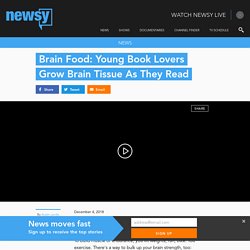
To build muscle or endurance, you lift weights, run, bike. You exercise. There's a way to bulk up your brain strength, too: Books. Reading is like doing burpees for your brain. Especially if you start young. A Carnegie Mellon study found when kids get intensive reading instruction early on, brains physically rewire themselves. Launch of new OECD PISA Equity report - EPI response - Education Policy Institute.
Today the Education Policy Institute hosted the launch of the OECD’s new PISA report, Equity in Education: Breaking Down Barriers to Social Mobility.
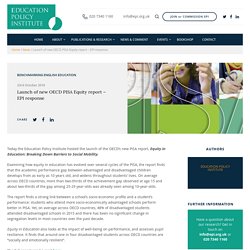
Examining how equity in education has evolved over several cycles of the PISA, the report finds that the academic performance gap between advantaged and disadvantaged children develops from as early as 10 years old, and widens throughout students’ lives. On average across OECD countries, more than two-thirds of the achievement gap observed at age 15 and about two-thirds of the gap among 25-29 year-olds was already seen among 10-year-olds. The report finds a strong link between a school’s socio-economic profile and a student’s performance: students who attend more socio-economically advantaged schools perform better in PISA. Yet, on average across OECD countries, 48% of disadvantaged students attended disadvantaged schools in 2015 and there has been no significant change in segregation levels in most countries over the past decade.
Reading Recovery ten years after intervention. SLA - Development and Discussion: Challenging More Able Readers. As we approach the new year, what better time to review and refresh your approach to challenging more able readers?
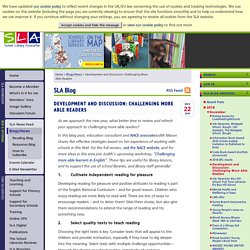
In this blog post, education consultant and NACE associateJudith Mason shares five effective strategies based on her experience of working with schools in this field. For the full version, visit the NACE website, and for more ideas in this area join Judith’s upcoming workshop, “Challenging more able learners in English”.
These tips are useful for library lessons, and to support the use of school libraries, and library staff generally! 1. Can children's books help build a better world? Let us set this upside-down world right again by starting with the children.

They will show the grown-ups the way to go. Those were the words of Jella Lepman, a German-Jewish writer who fled Germany in the 1930s and returned after the second world war as the US Army’s advisor on youth issues. She found starving children who desperately needed food, medicine, clothes and shelter. But Jella Lepman also believed they needed books: great children’s books to help them make sense of their experiences, connect them to the rest of the world, and show them they were not alone. Therapies and approaches. Excellence in research: inspiring creative pedagogies.
The pleasures of reading non‐fiction - Alexander - 2018 - Literacy. Literacy Resources. Scroll down for FREE photocopiable resources for all my books to support schools and libraries in class and home work and encourage reading and writing for pleasure.
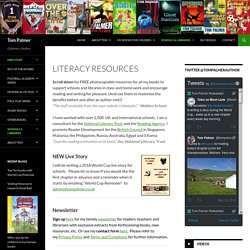
(And use them to maximise the benefits before and after an author visit!) “The stuff available from the your website is fantastic!” Walden School I have worked with over 2,500 UK and international schools. Ten a Term: 9 – 11 years, Summer 2018 — Reading Journey. My library teen reading group’s favourite reads ~ Savita Kalhan. Hi Matt, thanks for inviting me on your blog today and for being part of the amazing blog tour for THE GIRL IN THE BROKEN MIRROR!

So for my guest post today, I wanted to tell your readers about my teen library group’s favourite reads. I started the group because as a teenager I spent hours in the library and if there had been a group like this I would have joined it in a heartbeat! The kids in my group range from 10 to 16 years old, it’s a diverse group and it’s half boys and half girls, so the huge range of books we read are reflected in the dynamics of the group.
Also, because it’s a library group and we only have access to books on the library catalogue, we don’t get all the books that are published for middle grade, teen or YA readers, which is a real shame. It would be brilliant if all public libraries would stock at least one book of every title published, wouldn’t it? So here’s the list, which comes highly recommended by my teen library group: Books for Keeps No 229 March 2018. YA books: teaching resources. Vocabulary – caught or taught? By Jean Gross CBE, formerly the government’s Communication Champion for children and young people.
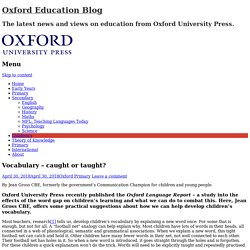
Oxford University Press recently published the Oxford Language Report – a study into the effects of the word gap on children’s learning and what we can do to combat this. Here, Jean Gross CBE, offers some practical suggestions about how we can help develop children’s vocabulary. Most teachers, research[1] tells us, develop children’s vocabulary by explaining a new word once. Narrow vocabulary 'hits pupils' grades' Closing the Vocabulary Gap Resources. So I *might* have mentioned this already, but I have gone and written a book – published officially this Friday!
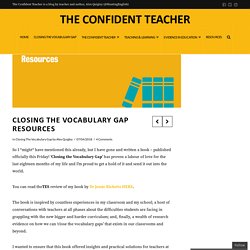
‘Closing the Vocabulary Gap’ has proven a labour of love for the last eighteen months of my life and I’m proud to get a hold of it and send it out into the world. You can read theTES review of my book by Dr Jessie Ricketts HERE. The book is inspired by countless experiences in my classroom and my school; a host of conversations with teachers at all phases about the difficulties students are facing in grappling with the new bigger and harder curriculum; and, finally, a wealth of research evidence on how we can ‘close the vocabulary gaps’ that exists in our classrooms and beyond. I wanted to ensure that this book offered insights and practical solutions for teachers at every key stage and phase.To support this, I have added free resources to my blog to run alongside the book – making it more user friendly. Preparing a Reading for Pleasure policy. In March 2012 Ofsted published the document Moving English Forward.
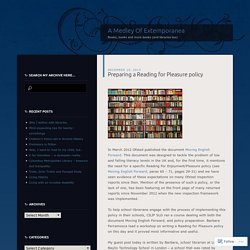
This document was designed to tackle the problem of low and falling literacy levels in the UK and, for the first time, it mentions the need for a specific Reading For Enjoyment/Pleasure policy (see Moving English Forward, paras 65 – 71, pages 29-31) and we have seen evidence of these expectations on many Ofsted inspection reports since then. Mention of the presence of such a policy, or the lack of one, has been featuring on the front page of many returned reports since November 2012 when the new inspection framework was implemented. To help school librarians engage with the process of implementing this policy in their schools, CILIP SLG ran a course dealing with both the document Moving English Forward, and policy preparation.
Reading for Pleasure Policy. Why have a Reading for Pleasure Policy Since March 2012 it has been an OFSTED requirement that all state schools in the country have a Reading for Pleasure Policy (see Moving English Forward paras. 65 – 71, pages 29-31).
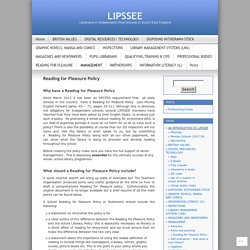
Although this is obviously not obligatory for Independent schools, several LIPSSEE members have reported that they have been asked by their English Depts. to produce just such a policy. As promoting a whole-school reading for enjoyment ethic is our field of expertise perhaps it could do no harm for us all to have such a policy? There is also the possibility of course that our ISI inspectors will not come and visit the library or even speak to us, but by submitting a Reading for Pleasure Policy along with all our other paperwork, we can show what the library is doing to promote and develop reading throughout the school. Reading for Pleasure. The Adventures We Go On Through Reading. By Vashti Hardy, author of Brightstorm What I love most about reading, and the thing that drives me to create fictional worlds, is that the landscape of reading is a place for all – it’s not just for the wealthy or the well-travelled, there’s no entrance fee other than a trip to the library or the price of a book.
A reading adventure is open to everyone. Through reading we have the chance to travel to infinite worlds, inhabit infinite characters, and have infinite adventures, and that’s a truly magical thought. I often think about my own reading journey and the steps that let me access the many reading adventures I’ve experienced. Books for Keeps No 228 January 2018. Debbie's Print-Ready Bonus Goodies - Debbie Ridpath Ohi (Twitter: @inkyelbows) By Debbie Ridpath Ohi (last updated December 17, 2017) CATEGORY INDEX: By picture book - Posters - Bookmarks - Picture Book Creators - Young Writers - Young Illustrators - Cartoonists - Reading logs & recommendation sheets (including Donalyn Miller's 40 Book Challenge) - Gift Cards & Certificates - Crafts - Calligraphy *** Looking for the 40 Book Challenge forms that Donalyn Miller has endorsed beside her own?
Here they are. . *** 'We need a change in attitude towards reading in secondary' In the wake of GCSE results day this year, there has been a predictable focus on the change of assessment system in the "core subjects". Clearly, this shift in assessment has had an impact on attainment, with a marked decline in children getting the top grades within the new numerically graded system. This is a worrying problem for educationalists to grapple with, and strikes at the heart of the problem we face. How do we raise standards without jeapordising our children’s futures? Shrouded within this debate is the issue of literacy rates. Over the past year, literacy challenges have become increasingly apparent.
Renaissance conducted research on almost 1 million young people’s reading habits across 3,897 schools, in partnership with the University of Dundee. In the final year of primary school, pupils’ ages typically match up with their "reading age". Teaching the Art of Reading in the Digital Era. Lucas Maxwell reluctant reader handout. WBD quiz: The Moderately Large World Book Day Quiz 2018. Teaching science through stories. Encouraging a Love of Reading in a Culture of Assessment - Quiet Revolution. Teacher top tips: how to get every child reading for pleasure. LibriVox. Gutenberg. Book reviews. For Kids Working On Their Reading Skills, Shelter Cats Make The Perfect Audience. Once a month, kids pull up chairs in front of a wall full of cats in kennels who are waiting to be adopted. The children introduce themselves, and they begin to read.
They read stories about zoo animals and tales of heroes on long journeys in far off places. Some older kids catch the cats up on novels they’ve been reading before they launch into the book. It’s a popular program that was started by the Animal Rescue League before it merged with the Humane Society to become the Humane Animal Rescue. LitzyDitz 2018 Reading Challenge. What To Read After... Diary of a Wimpy Kid. LIBRARY STUFF: HOW I CHALLENGE MY READING GROUPS - STARTING WITH THE BOOK. 52 YA Books That Need To Be On Your Reading List This Year. Mark Billingham: ‘I don’t finish any book I’m not enjoying. Reading should be a pleasure'
The book I am currently readingThe Old Religion by Martyn Waites. Katherine Rundell: ‘The only time kids fully understand the world is when they read’ The role of books in developing empathy and building emotional resilience in children. More than 770,000 UK children 'don't own a book' LONGLISTS ANNOUNCED FOR THE 2018 UKLA BOOK AWARDS. @The_UKLA #UKLA18 #teachersbookawards. Lollies Awards 2017 shortlist: Discover the funniest books of the year. Improve pupils' reading skills to boost their science grades. Improving the literacy skills of poorer pupils is a way of improving their results in science, researchers have found. A review of leading international research, published today by the Education Endowment Foundation and the Royal Society, also says it is important for pupils to carry out scientific experiments and trials. Books for Keeps No 227 November 2017. Reading for pleasure 'boosts pupils' results in maths' Library media\documents\Readingforpleasurestoppress.
The lifelong benefits of reading for pleasure - Dr Alice Sullivan - UCL Lunch Hour Lectures. R60818. Reading on Paper and Digitally: What the Past Decades of Empirical Research RevealReview of Educational Research - Lauren M. Singer, Patricia A. Alexander, 2017. Students learn more effectively from print textbooks than screens, study says. Today’s students see themselves as digital natives, the first generation to grow up surrounded by technology like smartphones, tablets and e-readers.
Teachers, parents and policymakers certainly acknowledge the growing influence of technology and have responded in kind. We’ve seen more investment in classroom technologies, with students now equipped with school-issued iPads and access to e-textbooks. In 2009, California passed a law requiring that all college textbooks be available in electronic form by 2020; in 2011, Florida lawmakers passed legislation requiring public schools to convert their textbooks to digital versions. Given this trend, teachers, students, parents and policymakers might assume that students’ familiarity and preference for technology translates into better learning outcomes. But we’ve found that’s not necessarily true. Book reviews. 'We're told to be grateful we even have readers': pirated ebooks threaten the future of book series.
2017 06 01 free research celebrating reading enjoyment final 4uGtNrp. On a new golden age of children’s fiction – inventive, vivid, unsettling. Bookfinder. Booklists. Untitled. GCSE pupils 'struggling to read exam papers' Books for Keeps No 226 September 2017. Email.bellamystudio. Reading Agency. I was an ordinary kid in an Australian country town, but through books I travelled the world.
Outcomes Framework Toolkit 2016 printable FINAL. 15 Book and Reading Related Apps for Children – Schools' Library Service Guernsey Blog. Lib5 20t 1. 101 books to dive into this summer: A reading list. Books for Keeps No 225 July 2017. Book List: Novels with Antifascist/nazi Themes. Bookbuzz author blog: S.F. Said - The epic story of Phoenix. Love Reading 4 Schools. Books - Friday August 18 2017. Dedicated reading time needs to be at the heart of the school day.
Coming Soon. The CILIP Carnegie and Kate Greenaway Awards. Feminist Fiction, Graphic Novels & Non-Fiction (a list in progress) How to Raise a Reader - Books Guides - The New York Times. Books for Keeps No 224 May 2017. Reading for pleasure falls after primary school years. Hello, we’re Oxford University Press. The Wellington English 100 1994bs5. Y9 reading and preparation for the19th century novel. Books for Keeps No 224 May 2017. Book Award Winners. Twitter. 19 Teen Books That Deal with Mental Health. Nature non-fiction booklist booklist. New reading lists! Check out these great books about #mentalhealth and #wellbeing from the library now ☀️ Books for Keeps No 223 March 2017. A Hunger for Dystopia: Critical Thinking on the Journey to Self-Discovery. For teachers and librarians — Worldquake – Dragon's Green by Scarlett Thomas.
Books for Keeps No 223 March 2017. R60818. Science and Fiction: A guest post from author Christopher Edge.